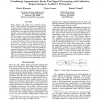Free Online Productivity Tools
i2Speak
i2Symbol
i2OCR
iTex2Img
iWeb2Print
iWeb2Shot
i2Type
iPdf2Split
iPdf2Merge
i2Bopomofo
i2Arabic
i2Style
i2Image
i2PDF
iLatex2Rtf
Sci2ools
117
click to vote
AAAI
1997
1997
Combining Approximate Front End Signal Processing with Selective Reprocessing in Auditory Perception
When dealing with signals from complex environments, where multiple time-dependent signal signatures can interfere with each other in stochastically unpredictable ways, traditional perceptual systems tend to fall back on a strategy of always performing nelydetailed, costly analysis of the signal with a comprehensive front end set of signal processing algorithms
SPAs
, whether or not the current scenario requires the extra detail. Approximate SPAs
ASPAs
algorithms whose processing time can be limited in order to trade o precision in their outputs for reduced execution time can play a role in producing adaptive, less-costly front ends, but their outputs tend to require context-dependent analysis for use as evidence in interpretation. This paper examines the IPUS
Integrated Processing and Understanding of Signals
architecture's ability to serve as a support framework for applying ASPAs in interpretation problems. Speci cally, our work shows that it is feasible to include an app...
AAAI 1997 | Intelligent Agents | Multiple Time-dependent Signal | Signal Processing Algorithms | Traditional Perceptual Systems |
| Added | 01 Nov 2010 |
| Updated | 01 Nov 2010 |
| Type | Conference |
| Year | 1997 |
| Where | AAAI |
| Authors | Frank Klassner, Victor R. Lesser, Hamid Nawab |
Comments (0)

